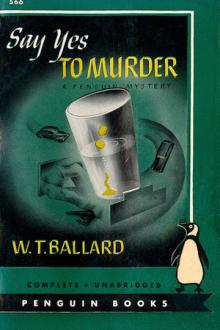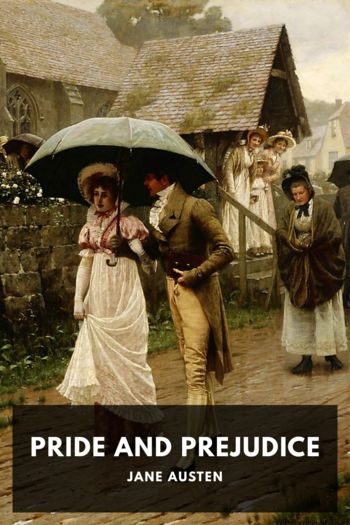Say Yes to Murder by Todhunter Ballard (pride and prejudice read .TXT) 📕

- Author: Todhunter Ballard
- Performer: -
Book online «Say Yes to Murder by Todhunter Ballard (pride and prejudice read .TXT) 📕». Author Todhunter Ballard
He said, with a lot more confidence than he actually felt: “You’re doing some tall guessing, sweetheart. And you’re hitting very far off the mark.”
She smiled, her good humor returning. “No, William. You’ve got a ready tongue, my lad, and you’ve talked yourself out of a number of jams, but I don’t think you’ll manage to talk yourself out of this one. Did you kill Tina Kingstone?”
She caught him off guard. He’d been so busy thinking of Heyworth that he had forgotten Kingstone’s death. “And why in heaven’s name should I kill her?” he snapped.
Her voice was idle. “For the same reason that you would love to strangle me at the moment. Maybe she saw you when you carried Heyworth’s body out in that box…”
Lennox had played too much poker and pinochle with experts to let his expression change. “So now I’m moving bodies in boxes?”
“Accusing? Accusing…” Spellman looked at Lennox and his immobile face.
She smiled, not sweetly. “I read the papers, son. The police found splinters in the fabric of Leon’s coat. And that’s not all I know.” Then abruptly she said: “I wonder what I should wear when I testify at your trial.”
Lennox was beginning to get frightened, but not for himself. This girl was serious, and her inherent vindictiveness would carry her to almost any lengths. Jean Jeffries had taken a man away from her in a public restaurant. It did not matter that she had never loved the man or that he was now dead. If she could hurt the Jeffries girl, she would.
“And just when,” he asked casually, “are you going to communicate these suppositions to the police?”
“In a very few minutes,” she told him confidently. “I’ve already called Captain Spellman. He promised to be here by eleven. Do you want to wait?”
4.
Detective Captain Spellman had on a gray suit that was too small for him. As the big man settled in a chair Lennox feared the suit would part company at the seams. Spellman had expressed no surprise at sight of Lennox.
“I got your call, Miss Foster.”
Kitty said: “It’s odd to have the man you are accusing present when you testify. I find it embarrassing.” But there was no embarrassment in her manner. The smile that twisted her lips was maliciousness itself.
He said, “If this is another gag you two worked up, I’ll make you both sorry for it.”
“It’s no gag,” Bill told him. “In about one minute our little friend is going to pin a murder rap on my shoulders. If she only had evidence to back her charge, it could be serious.”
“Murder?”
“Yes,” said Kitty Foster. “Leon Heyworth’s death—or is that case already ancient history?”
Spellman swore. In all his years around Los Angeles he’d never managed to get used to picture people and their ways. “So you know something of Heyworth’s death. Why didn’t you tell it sooner?”
She met his look with widened eyes, a little starry, a little scared. Watching her, Lennox could not help a sudden surge of inner pride. The result of four years’ work was evident. Whatever else this girl was, she was an actress, and she certainly had not been when he first lifted her out of the extra ranks. Spellman was her audience and she was playing directly to the house.
She nodded. “I was grief-stricken when I heard of Leon’s death. We were friends, you know—just friends, but very good friends.”
Spellman said: “I understand.”
“So,” she continued, “I got to thinking and realized that my duty to my dead friend and to society was greater than my duty either to myself or to the studio. Let me tell you what I know. I was with Leon Heyworth on the night he died. We went several places, ending at the Beverly Derby. There we were joined by little Jean Jeffries.”
The way she said “little Jean” you pictured a girl of the Shirley Temple age. “They took me home, and that’s the last I ever saw of Leon Heyworth alive.”
A note of impatience had crept into Spellman’s voice. “We know all that.”
She said, “Of course,” as if she were apologizing for her own stupidity. “The next morning Mr. Lennox came to my dressing room and asked me where Leon Heyworth was. He was quite insulting—so insulting that he made me angry. I did something I perhaps shouldn’t have done. I drove out by the apartment where Jean lives, and I saw Leon’s car parked a block down the side street.”
She had Spellman’s full attention, and she shot a triumphant glance at Lennox. But if she expected to see fear on the troubleshooter’s face she was disappointed.
“A friend of mine has an apartment across the street. I went there and from the window watched Lennox enter Jean’s building. It was then that I did a silly thing. He was in the building so long that I suspected something terrible must have happened. I know Lennox so well…. He and Leon always disliked each other. If Leon had been alive one or both of them would have left as soon as Lennox arrived. That’s why I called the police. I told them to go to Jean’s apartment because they’d find a body there.”
“So it was you!” Spellman’s face reddened a little. “You’d have saved us a lot of trouble, Miss Foster, if you had given your name.”
She nodded contritely. “I know it.”
He forgave her with a heavy smile. “Well, better late than never. Go ahead.”
She took a deep breath. “I… I saw you drive in and then saw you leave, and I couldn’t understand it. I was just going to go myself when I saw Lennox come out. His manner was furtive. There is no other word for it. I knew he was up to something the minute I saw the way he acted. He looked up and down the street as if afraid to be seen. Then he turned and hurried up the side street as far as Leon’s car.
“I could hardly believe my eyes when I saw him unlock the door, get in, and drive away. I was puzzled. I couldn’t understand what had happened. And then I read in the papers that Leon’s body had been found in his own garden and that his car was parked on the fire road below his house.”
Spellman sucked in his breath noisily. “You didn’t see Lennox carry out a body or a box and put it into that car?”
The girl shook her head. “No,” she said honestly. “And I can’t figure it out, unless it was that truck.”
“Truck! What truck?”
Kitty explained: “Before that—quite a while before—a truck pulled into the alley behind the apartment building. I think it was one of those U-drive-it kind. It had a box in it when it pulled in, and the box was still there when the truck pulled away.”
“That’s it,” Spellman said slowly. “That’s it.” He faced Lennox, and a trace of sadness mingled with his exultation. “Sorry, Bill, but I have to do it.”
“Do what?” said Lennox, opening his eyes.
“Arrest you for the murder of Leon Heyworth.”
“That,” Lennox told him, “would be one of the most stupid tricks of your silly career. You admitted yourself that Heyworth had been dead a lot more than twelve hours when he was found. I’ve already told you I have an alibi for the whole period during which he must have been killed.”
Spellman grunted. “Alibi or no, we’ve got you. I’m sorry, Bill. I really am.”
“She’s not,” said Lennox, getting slowly to his feet. “She’s bursting with pride. So long, rat.”
The girl’s smile was sweet. “I’ll bring you hot coffee, honey—and cigarettes. I’ve always wanted to visit in the death row. You meet such interesting people.”
5.
Deputy District Attorney Young was a gray man with a dry, precise way of speaking and a politician’s sense of values. He needed no one to tell him what this case would mean. There were a lot of big names involved, and the news value of the story was tremendous. He knew that until this went to trial he would find his name on page one almost any morning.
It was the Young luck. His chief was out of town on a good-will tour of South America, and if his luck held the case would have ended in a conviction long before his chief returned.
Martin Young was nonplussed. He had faced a great many wrongdoers during his years in public office. They were either sullenly silent, noisily defiant, or openly scared.
Lennox just looked amused, and Young demanded: “What do you find so funny?”
“You,” said Lennox, and took a seat beside Young’s desk. He casually pulled a loose cigarette from his side pocket, twisted it between strong fingers until he had spilled the tobacco out of each end. Then he crimped the ends carefully as if rolling a home-made and stuck it into his mouth.
Young said: “Stop that! There’ll be no smoking here.”
Lennox said: “I saw a good play once by a couple of Chicago newspapermen. They called it ‘Front Page,’ and you remind me of the sheriff. Maybe you saw it?”
Young had seen it, and he did not like the comparison. He turned angrily to Spellman. “Did you bring this man here for questioning or not?”
Spellman was secretly enjoying the discomfiture of the deputy district attorney, but he felt that the honor of the office should be upheld.
“I did,” he said flatly. “This man is involved in the Heyworth death. I don’t know whether he did the actual killing. We’ve checked his whereabouts on the night of the murder and he does have an alibi. But he certainly knows much more than he has told.” Spellman went on to repeat Kitty Foster’s story.
Young had the tips of his fingers pressed together and his elbows resting on the arms of his chair in his best attentive attitude. When Spellman had finished he blinked bleakly toward the big captain.
“Is there anyone to corroborate her testimony?”
Spellman nodded. “Yes, sir. The girl from whose apartment she watched the street. The girl’s name is Beth Snyder. She serves as standin for Miss Foster.”
Young swung his chair so that he faced Lennox without turning his head. “All right. What have you to say for yourself?”
“Nothing! Why should I?”
“Nothing!” The deputy district attorney was exasperated. “Do you realize the serious trouble you’re in? I think not. Otherwise a man of your obvious intelligence would alter his attitude.”
Lennox’ smile was cherubic. “Thanks for recognizing my intelligence. Does it occur to you, Mr. Young, that perhaps the reason for my lack of nervousness is simply that I have nothing to be nervous about?”
“You mean you deny Miss Foster’s statement?”
“A denial wouldn’t mean anything,” Lennox informed him. “Remember I’m not under oath.”
“There are ways,” Young said darkly, “of making you talk.”
“The wrecking squad? Come, come, Counselor. You’ve been reading books and seeing B pictures. Certainly you don’t believe that the fine gentlemen—the Los Angeles police—would resort to anything as crude as a rubber hose, especially when the victim’s lawyer is waiting in your outer office.”
Young looked at Spellman, who nodded. “Sam Marx!” the police captain said dolefully.
Young said something not in keeping with his appearance. “That shyster!”
Lennox’ smile widened. “Sam will be glad to know your opinion of him. I’d hate to repeat what he called you just before I came in.”
Young changed his method of attack. “What about the girl—Jean Jeffries?”





Comments (0)